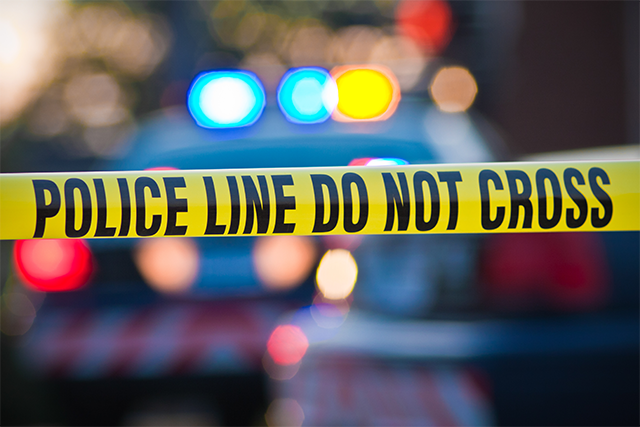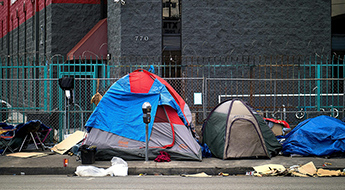U.S. Surgeon General Declares Gun Violence a Public Health Crisis
Advisory cites IPR faculty research on gun violence interventions and statistics
Get all our news
Calling collective action on firearm injury and mortality as a public health crisis is something we can and must attend to. ”
Rinad Beidas
IPR associate

The U.S. Surgeon General declared gun violence a public health crisis due to the sharp rise in firearm injuries since 2020. A first-of-its-kind report issued by Dr. Vivek Murthy provides a look at the crisis, drawing on available scientific evidence including research from five IPR faculty.
Gun violence is now the leading cause of death among children and teenagers, surpassing car crashes, cancer, drug overdoses, and poisoning. In 2022, 48,204 people died from gun-related injuries, marking an increase of over 8,000 deaths compared to 2019 and more than 16,000 compared to 2010.
“Calling collective action on firearm injury and mortality as a public health crisis is something we can and must attend to. We have things that work; we need to implement them and study them,” chair and professor of medical social sciences and IPR associate Rinad Beidas said.
Community Violence Intervention
The report cites a study by IPR director and sociologist Andrew Papachristos and his colleagues at CORNERS, the Center for Neighborhood Engaged Research & Science, on community violence interventionists in Chicago. These are trained civilians who work to stop street and gun violence. The study found that 94% of these workers showed signs of secondary traumatic stress, such as emotional numbness and difficulty sleeping, due to their work.
“This report is another wake-up call for solutions to address the staggering toll gun violence continues to inflict on Americans each year,” Papachristos said. “Our research points to a way forward. It starts with an investment in street outreach workers, who use their lived experiences with gun violence to help break the cycle of violence.”
Impact on Children and Adolescents
Survivors of school shootings face significant long-term consequences, such as anxiety and depression. The report highlights a study co-authored by IPR economists Molly Schnell and Hannes Schwandt which looks at youth antidepressant use following school shootings. The study shows that in the two years following a fatal school shooting, the use of antidepressants among local youth goes up by 21%.
“The enduring consequences of school shootings on the trajectories of affected children demonstrate that the negative repercussions of these tragic events persist long after public attention has waned,” Schnell said.
Surviving a firearm injury can have both short-term and long-term health effects and is linked with a higher risk for future injury. The report cites a study by Beidas that examines the long-term consequences of firearm injuries and exposure to others’ injuries—such as suicide, assault, and mass shootings—on children's mental and physical health. It highlights that chronic behavioral health problems like post-traumatic stress disorder (PTSD), anxiety, depression, and substance abuse disorders are linked to firearm injuries.
Mental Health and Violence
While individuals involved in mass shootings often have mental health issues, experts warn against oversimplifying the link between mental health diagnoses and violent behavior.
The report features a study by behavioral scientist and IPR associate Linda Teplin which shows that people with serious mental illness are more likely to be victims of violence themselves, even after accounting for other factors.
This finding underscores the complexity of tackling gun violence and addressing factors like mental illness. Teplin emphasizes that confronting firearm violence requires a broad, holistic approach. Her study suggests that improving housing and financial stability could not only lower the risk of people with serious mental illness becoming victims of violence, but also make communities safer overall.
“To reduce firearm violence, a creative and multidisciplinary approach is needed, one that involves legal and health care professionals, street outreach workers and public health researchers,” Teplin said. “Poverty also begets violence. We need to address the compound issues that lead to urban blight, such as inadequate housing, unemployment, and poor infrastructure.”
Andrew Papachristos is professor of sociology, IPR director, and the John G. Searle Professor of Sociology. Linda Teplin is the Owen L. Coon Professor of Psychiatry and Behavioral Sciences, professor of medicine (infectious diseases), and vice chair for research in psychiatry and behavioral sciences. Molly Schnell is assistant professor of economics. Hannes Schwandt is associate professor of human development and social policy. Rinad Beidas is chair and Ralph Seal Paffenbarger Professor of Medical Social Sciences at the Feinberg School of Medicine. All are IPR faculty.
Photo credit: iStock
Published: August 1, 2024.


